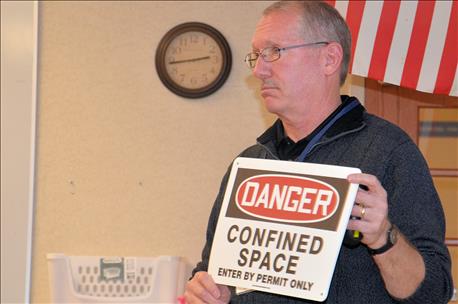
Mike Manning travels Indiana these days, primarily training potential young workers about how to stay safe in confined spaces. He usually doesn’t give a presentation, however, without recalling his days growing up on a farm in southwestern Indiana.
“My dad had me doing all kinds of things,” he recalls. “Young people tend to do what a parent or boss tells them, even today. Even if was doing something that people today might consider dangerous, I did it if asked, and many other kids did too. Many still do.”

LEARNING WHAT'S SAFE: Mike Manning travels the state talking to high school kids and other young potential workers, primarily about the dangers of working in a confined space.
That brought back memories of my own. I did plenty of things I would never do now, or never ask my son or daughter to do. I did them because I didn’t know any better, and neither did my dad. And like Manning, I knew dad asked me to do these things just because he thought it was OK and he needed help.
“I know my parents loved me,” Manning insists. My parents loved me too. However, decades ago, before improved safety training and programs such as those developed by Bill Field, Manning’s boss, you could make the case that ‘people just didn’t know better.’ Field is the Purdue University ag safety specialist.
Here are two examples from my own background.
2. Kick down the corn
Our corn was picked on the ear, and put in those tall wire corn cribs, or sometimes in old wooden corn cribs attached to the side of a barn. When the crib was nearly full, dad wanted to stuff in as much corn as he could. So he wanted it full under the peaked roof of a wire crib, or wanted it up to the rafters in the wooden crib.
That meant someone needed to crawl in there and kick down the corn. Ear corn doesn’t roll well, especially if it’s not real dry. It also doesn’t let you sink in and become trapped like shelled corn. But that doesn’t mean it’s safe.
I would climb up the elevator, an old-fashioned chain elevator, open to the world, slither my way down through the opening of the corn crib, and kick back corn as dad unloaded it, literally on top of me, especially if I wasn’t paying attention.
Imagine the scenario. Dad was standing at the elevator, gas engine blaring, old chains on the elevator rattling, and he was trying to watch me through the slats, or hear me, or watch for me to stick my hat up through the hole, indicating it was full. I always survived intact, but talk about not smart!
2. ‘Help’ the silo unloader.
It was a big deal when the landlord finally built us a silo with an unloader and a feed bunk. That meant I didn’t have to climb the old silo and fork it down by hand. The only problem was he couldn’t see why he should spend money on a roof. I could tell him why!
Invariably, if it was cold or icy, the silage on top would freeze up and the unloader would fail to pick it up, or the unloader drive wheel would get stuck against the wall. Dad figured out it was a good idea if me or my brother climbed up the chute, into the silo, and ‘pushed’ the auger while he stood below and turned it on and off. Yes, it had a shield over the auger, but talk about a dangerous work environment! There was electricity, an auger, loud noise, no contact with the unloader operator- all the ingredients for disaster. My brother and I survived it. Would I do it today? No!
If you think about it, you’ve probably done things that weren’t overly smart either. Even if you are still in one piece, use this as a wake-up call to rethink what’s safe and what’s not.
About the Author(s)
You May Also Like




